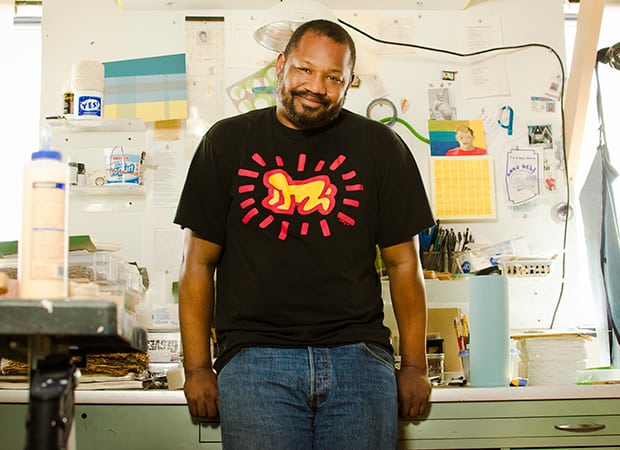
In a city full of American landmarks, Boston’s Faneuil Hall is one of the most recognizable. It’s also one of the most problematic. The colonial building, which has been the site of numerous historic speeches, debates, and public events since it was erected in 1743, is named after Peter Faneuil, a merchant who made his fortune from the slave trade. In 2017, the Boston-based advocacy group the New Democracy Coalition campaigned to have the building renamed, but the city’s mayor Marty Walsh refused.
Steve Locke has another idea for addressing this history. The Boston-based artist has proposed a new memorial evoking an auction block—like those once used to sell slaves—outside Faneuil Hall. And he’s launched a crowdfunding campaign to make it a reality.
“I think the era of heroic statuary is over,” the artist, who has lived and worked in Boston for the past 30 years, tells artnet News. “We think that the function of memorials is to glorify. It’s not. The role of the memorial is to indict. It’s to say, this happened here, and we’re never going to forget it.”
Faneuil Hall in Boston, 2017. Photo: Dina Rudick/The Boston Globe via Getty Images.
Locke’s proposed monument would permanently replace cobblestones in front of Faneuil Hall with a 16 by 10 foot bronze plate, recreating the exact footprint of an auction block. Embossed on the plate would be an map of the transatlantic triangular trade that moved slaves and goods across three continents throughout the 18th and 19th centuries.
The whole artwork would be heated year-round to a constant 98.6 degrees Fahrenheit to remind viewers of the human lives destroyed by slavery. (The heated work is also a nod to German artist Horst Hoheisel’s Monument to a Monument (1995) in Buchenwald, Germany). Even on a snowy New England winter day, the warm monument will remain visible.
The idea for the memorial came to Locke last year, when he was chosen to be one of seven artists-in-residence for the city of Boston. He and the other grantees were tasked to think about the city through the lens of resilience and racial equity.
“It’s an open secret in Boston,” he says. “Peter Faneuil was a slaver—everyone knows it. But there’s no marker, nothing to indicate that. So in a very simple way, I just wanted to make a gesture that linked that edifice to the man and how he made his money.”
The artist is not shy about his belief that Boston itself should pay for the monument. And while he has secured the mayor’s blessing to proceed with the project, he knows that full funding from the city is not a reality. (Unlike many other major, Boston does not have a dedicated public arts arm.) Thus, on Juneteenth—the annual celebration of the end of slavery—Locke launched a Kickstarter to fund the first phase of the project, a $30,000 goal that would cover research, fabrication, and the creation of an informational website.
An initial rendering of Steve Locke’s proposed memorial. Courtesy of the artist.
“I thought, ‘how do I show that there’s a demand for this, that this isn’t just my own ego is driving this thing?’” asks Locke, explaining the importance of the crowdfunding model. “I just said, ‘look, if people want it, then they can actually contribute to making it happen.’ I think that people are interested, I really do. People acknowledge this history and I think that, given the opportunity, they’ll support the effort to have it literalized.”
So far, he’s right. A day after the crowdfunding campaign kicked off, 68 people had already donated $9,300.
Locke estimates that the memorial will cost roughly $300,000 in total. Half of that will be covered by a grant awarded to Locke by the Edward Ingersoll Browne Fund, a Boston-based public art trust, with the stipulation that he raise the other half. If Locke realizes his goal, the project will be revealed a year from now—Juneteenth 2020.